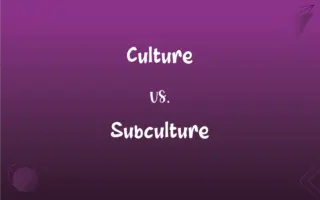Before vs. Prior: What's the Difference?
Edited by Aimie Carlson || By Janet White || Published on December 14, 2023
Before refers to an earlier time or event. Prior also denotes earlier time, often used in formal contexts or to imply precedence in importance.

Key Differences
Before is commonly used in everyday language to indicate a time earlier than a specific point. Prior shares a similar meaning but is often used in more formal or official contexts.
In usage, before is more versatile, fitting both formal and casual contexts, whereas Prior is typically reserved for more formal or technical scenarios. Prior often implies a sense of precedence or priority.
Before can be used as a preposition, adverb, and conjunction. In contrast, prior is predominantly used as an adjective and sometimes as a noun, especially in legal or formal writing.
Before is frequently used in everyday speech and writing, suggesting a sequence in time. Prior, while also indicating time sequence, often carries an additional connotation of importance or urgency.
The word before is straightforward and universally understood, making it suitable for general communication. Prior can imply a degree of formality and is often used in business, legal, and academic contexts.
ADVERTISEMENT
Comparison Chart
Usage Context
Both formal and informal
Mostly formal or technical
Implication
Simple sequence in time
Sequence with a sense of importance
Part of Speech
Preposition, adverb, conjunction
Adjective, sometimes a noun
Frequency in Language
Common in everyday language
More common in formal writing
Connotation
Neutral, chronological reference
Often suggests priority or urgency
ADVERTISEMENT
Before and Prior Definitions
Before
In the presence of.
She presented the report before the committee.
Prior
Earlier or former.
The prior version of the software had many bugs.
Before
In front of, spatially.
The car stopped right before the stop sign.
Prior
Preceding in time or order.
Prior arrangements prevent me from attending.
Before
In consideration or anticipation of.
Think before you speak.
Prior
Preceding something in importance.
Health should be your prior concern.
Before
Earlier in time.
Finish your homework before dinner.
Prior
As an adjective, indicating precedence.
He has no prior experience in this field.
Before
Prior to an event or time.
Before the digital era, typewriters were common.
Prior
Higher in importance or rank.
Address the most critical issues prior to the others.
Before
Earlier in time
They called me the day before.
Prior
Preceding in time or order
“[They] insist that foreign vessels seeking access obtain prior approval” (Seymour M. Hersh).
Before
In front; ahead.
Prior
Preceding in importance or value
A prior consideration.
FAQs
Is 'prior' more formal than 'before'?
Yes, 'prior' is typically used in more formal contexts.
Which is more common in everyday speech, 'before' or 'prior'?
'Before' is more common in everyday speech.
Can 'before' be used as an adverb?
Yes, 'before' can function as a preposition, adverb, and conjunction.
Are 'before' and 'prior' interchangeable?
They can be, but 'prior' often implies a formality or precedence not always present with 'before'.
Is 'prior' used as a noun?
Yes, but primarily in legal or formal contexts.
Is 'before' used in formal writing?
Yes, 'before' is versatile and used in both formal and informal writing.
Does 'prior' always refer to time?
Mostly, but it can also refer to importance or precedence.
Can 'before' be used in legal documents?
Yes, though 'prior' might be preferred for clarity and formality.
Can 'prior' indicate importance?
Yes, 'prior' often carries a connotation of importance or urgency.
Are there instances where 'before' and 'prior' cannot be used interchangeably?
Yes, due to 'prior's' formal tone and implication of importance.
How does the usage of 'before' differ in writing and speaking?
'Before' is used similarly in both, but context dictates its formality level.
Is 'prior' used in everyday conversation?
Less frequently than 'before', as it is more formal.
Can 'before' imply spatial positioning?
Yes, it can indicate something happening in front of a particular location.
Can 'before' suggest a sequence of events?
Yes, it's commonly used to indicate a chronological sequence.
How do 'before' and 'prior' differ in terms of emphasis?
'Prior' tends to emphasize precedence or importance, while 'before' is more neutral.
Can 'before' be used in academic writing?
Yes, 'before' is suitable for academic writing.
Is 'prior' a common word in business contexts?
Yes, 'prior' is frequently used in business, legal, and academic writing.
Does 'prior' have a different meaning in law?
In legal terms, it often refers to something that precedes another in time or order.
Do 'before' and 'prior' have different origins?
Yes, they have different etymological origins but have converged in meaning.
Is 'prior' preferable in official reports?
Often, due to its formality and precise connotation.
About Author
Written by
Janet WhiteJanet White has been an esteemed writer and blogger for Difference Wiki. Holding a Master's degree in Science and Medical Journalism from the prestigious Boston University, she has consistently demonstrated her expertise and passion for her field. When she's not immersed in her work, Janet relishes her time exercising, delving into a good book, and cherishing moments with friends and family.
Edited by
Aimie CarlsonAimie Carlson, holding a master's degree in English literature, is a fervent English language enthusiast. She lends her writing talents to Difference Wiki, a prominent website that specializes in comparisons, offering readers insightful analyses that both captivate and inform.































































